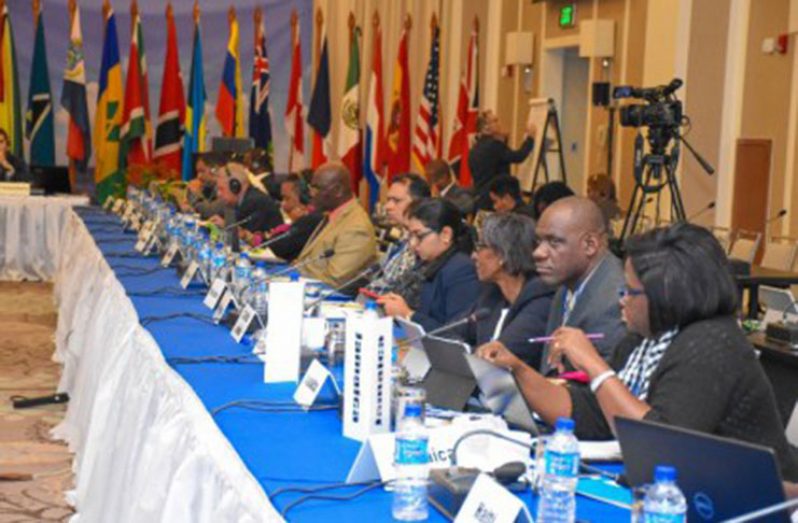…negative effectives continue to be felt at all levels
EXECUTIVE Director of the Caribbean Financial Action Task Force (CFATF), Calvin Wilson said the body will soon go on an international campaign to lobby for the removal of restrictions enforced by correspondent banks.
Speaking to the Guyana Chronicle on the margins of CFATF XLVI Plenary and Working Group Meeting at the Guyana Marriott on Monday, Wilson said though the Caribbean countries have been making steady progress in addressing the deficiencies within their Anti-Money Laundering and Countering the Financing of Terrorism (AML/CFT) regimes, their economies continue to be threatened as correspondent banks restrict or terminate their relationships with the local banks.
“De-risking is looming large across the region,” Wilson told Guyana Chronicle. According to the Financial Action Task Force (FATF), de-risking refers to situations where financial institutions terminate or restrict business relationships with categories of customers. The severing of correspondent banking relationships has impacted the performance of the four key macroeconomic sectors: real, fiscal, monetary and external.
The CFATF Executive Director said some countries in the Region are currently at the end of the Third Round of Mutual Evaluation, and though their compliance level is not satisfactory when compared with the international standards established by the Financial Action Task Force (FATF), progress is being made. Haiti, St. Maarten, and St. Vincent and the Grenadines are among countries at the Third Round of Mutual Evaluation but they are expected to exit after being reviewed by the CFATF International Cooperation Review Group (ICRG).
It was noted that since their Mutual Evaluation Reports were adopted by CFATF and published on its website, those countries have been rectifying the deficiencies within their Mutual Evaluation Reports as part of a follow process. According to him, “the countries have come a long way in terms of compliance.” “However, what is not being translated globally and to regulators around the world is the facts of the level of compliance that we are at, at the moment, and we think that if that were to be taken into account then some of the decisions being made with regards to de-listing may not have been taken,” the CFATF Executive Director noted.
Given the current situation, Wilson said CFATF will have to do more in terms of lobbying the international community to set the record straight. “So further work will be undertaken both by the membership and the secretariat in terms of engaging with all stakeholders—CARICOM Secretariat, the Eastern Caribbean Central Bank, the Caribbean Development Bank and all our countries in the region, making outreach around the world to ensure that what is happening in the region is told, the facts of the case in terms of compliance is told as well, and to dialogue and collaborate with organisations like the IMF who are witnessing the effects of de-risking not only in our regions but across the world,” the CFATF Executive Director said.
During a meeting in Antigua and Barbuda in October, which was organised by the CARICOM Secretariat, the `Guidance’ issued by FATF in October 2016 was embraced by the region with the anticipation that it would pave way for in depth dialogue.
“We in the region embraced that guidance document as the foundation for the dialogue that should take place between our respondent banks in the region and the correspondent banks who are now pulling out of the region,” he noted.
Wilson emphasised that de-risking and its effects on the region’s economy remain high on the agenda for the CFATF. It was pointed out that the issue of de-risking came up for discussion during the 27th Forum for Heads of Financial Intelligence Unit (FIU) AND the CFATF Working Group on Risks, Trends and Methods (CRTMG) Meeting on Sunday when the XLVI Plenary and Working Group Meetings started in Guyana on Sunday.
According to the CFATF, de-risking affects services and products, financial institutions and other agencies. The most severe effect of de-risking in the Caribbean has been the termination of the correspondent banking relationships which includes check clearing and settlement, cash management services, international wire transfers, trade finance and conducting foreign currency denominated capital or current account transactions. The financial institutions, agencies and other entities affected by de-risking include money transfer operators and other remittance companies, small and medium domestic banks, small and medium exporters, retail customers, international business companies, e-gaming/gambling.
The consequences, the CFATF Executive Director said, are truly being felt in the region.
“In one case a small business man wanted to continue importing goods from abroad to supply his business, to keep his employees in employment, and because of de-risking in a particular jurisdiction, he was unable to send wire transfers to import goods. So what he did, he left his country with an amount of cash and went to another country to purchase the goods, he did not declare the cash he took with him at the borders when he left his country, nor did he do so when he arrived. He was stopped and the cash was confiscated and he was placed in prison, as a consequence of that his business failed,” Wilson said, as he cited an example.
He said not only did the man’s business crumble but his employees were left jobless, and as such the effects were evident at the level of their families.
“It’s a real issue for the region and it is something we intend to keep our eyes on squarely, and will be working with partners around the world to see if we can assist in bringing a resolution to this issue,” the CFATF Executive Director said.




.png)









